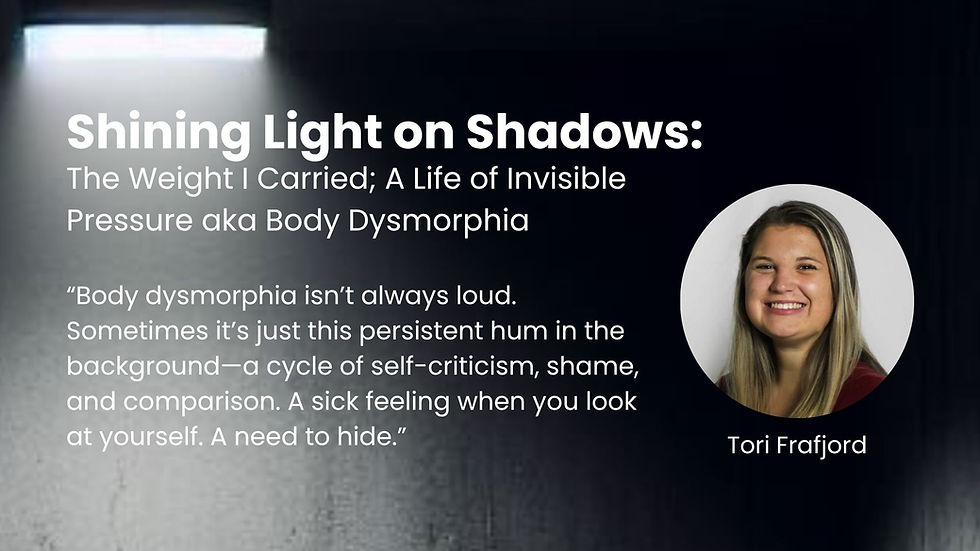The Weight I Carried; A Life of Invisible Pressure aka Body Dysmorphia
- Tori Frafjord

- Jul 31, 2025
- 4 min read
Updated: Aug 11, 2025

For a long time, I thought strength meant being quiet about pain. I thought resilience looked like never letting anyone see you cry, never asking for help, and never slowing down. A lot of that belief started in childhood.
Growing up, I learned early how to take care of others before myself. Whether it was being the “good kid,” the peacemaker, the perfectionist—I learned to read the room before I even entered it. I adapted. I survived. I was praised for being responsible, for doing well in school, for being mature beyond my years. But underneath all of that was a little girl who was anxious, scared, and unsure where she fit in the world.
Mental health wasn’t something we talked about at home. Emotions were something you kept in check. Struggling wasn’t really an option—it was just life, and you dealt with it. I didn’t have the language to express what I was feeling, so I bottled it up. I internalized every mistake, every awkward moment, every time I felt like I wasn’t enough.
I will be the guest on a show hosted by Neil Parekh and Dawn Helmrich Neuburg. It's Ep. 33 of “Shining Light on Shadows: A Candid Conversation About Mental Health,” Thursday, July 31 at 6pm CT / 7pm ET. We will be focusing on Body Dysmorphia. You can watch the live show or recording on Facebook, Twitter*, LinkedIn, YouTube or Instagram*.
*We won't know the exact urls for Twitter or Instagram until we go live on Thursday. For now, these links go to Neil's Twitter and Dawn's Instagram.
If you click on the social media links above, and comment, we can put it on screen. You can also just watch the recording or live show right below.
I remember crying alone in my room over things I didn’t know how to explain—feeling too sensitive, too emotional, too different. I remember feeling like I had to earn love by being good, by achieving more, by never being a burden. And while all of this was happening emotionally, something else was growing quietly inside me: a toxic relationship with my body.
From a young age, I picked myself apart in the mirror. I saw flaws no one else seemed to notice—or at least, they didn’t talk about them like I did. I felt like I took up too much space, physically and emotionally. I obsessed over the way clothes fit, how I looked in photos, how other people might see me. I compared myself constantly, convinced that if I could just look a certain way, maybe I’d finally feel worthy. Maybe I’d finally be lovable.
Body dysmorphia isn’t always loud. Sometimes it’s just this persistent hum in the background—a cycle of self-criticism, shame, and comparison. A sick feeling when you look at yourself. A need to hide. A voice that takes every reflection and turns it into something cruel. And when that voice overlaps with anxiety and perfectionism, it feels like you're never truly safe—not even with yourself.
As I got older, that inner pressure only grew. Perfectionism became a coping mechanism. If I could just do everything right—if I could just be perfect—maybe I’d finally feel okay. Maybe I’d finally be enough.
But I wasn’t okay.
I carried that unspoken weight into adulthood, into college, into work. Into every space where I felt like I had to prove myself. I chose a career I love—veterinary medicine—because animals have always felt like home. They don’t expect perfection. They don’t judge. They just feel. And being around them made me feel like I could finally breathe.
But even in this field of compassion, I began to burn out. The long hours, the emotional toll of euthanasia, the pressure to balance work and school, financial strain, and the constant need to stay composed—it all collided with the unresolved pieces of my past. I became so anxious that even small tasks felt impossible. I started having panic attacks. I’d spiral over my appearance and then feel ashamed for even caring. I cried after work more times than I can count.
Eventually, I broke. And as terrifying as that was—it was also the beginning of healing.
Therapy became a lifeline. It gave me a space to speak about the things I had kept buried for years. I began to unpack the belief that my value came from how I looked or how much I achieved. I started medication too, and it helped more than I expected. It gave me just enough clarity to push back against the lies I’d been living with.
I started to understand that the way I saw myself—mentally and physically—was shaped by trauma, by old narratives I never consented to, and by unrealistic expectations I’d been carrying since childhood. I began practicing something that once felt completely foreign: compassion. For my younger self. For my anxious mind. For my body. For the version of me that just needed to be loved, not fixed.
I still have hard days. I still struggle with the mirror. I still hear that voice telling me I’m not enough or I’m too much. But now, I will talk back to it. I offer myself softness, even when it feels uncomfortable. I take rest seriously. I allow myself to slow down. I remind myself that I don’t need to be perfect to be worthy.
If you’re someone who grew up holding your breath, always trying to be enough, always feeling like your body is the problem—I see you. You are not broken. You are not alone. You don’t have to carry it all in silence.
I’m still healing. Still growing. Still learning how to be kind to the girl I once was—and the woman I’m becoming. But I’m here. I’m trying. And for the first time, I’m starting to believe that’s more than enough.






Comments